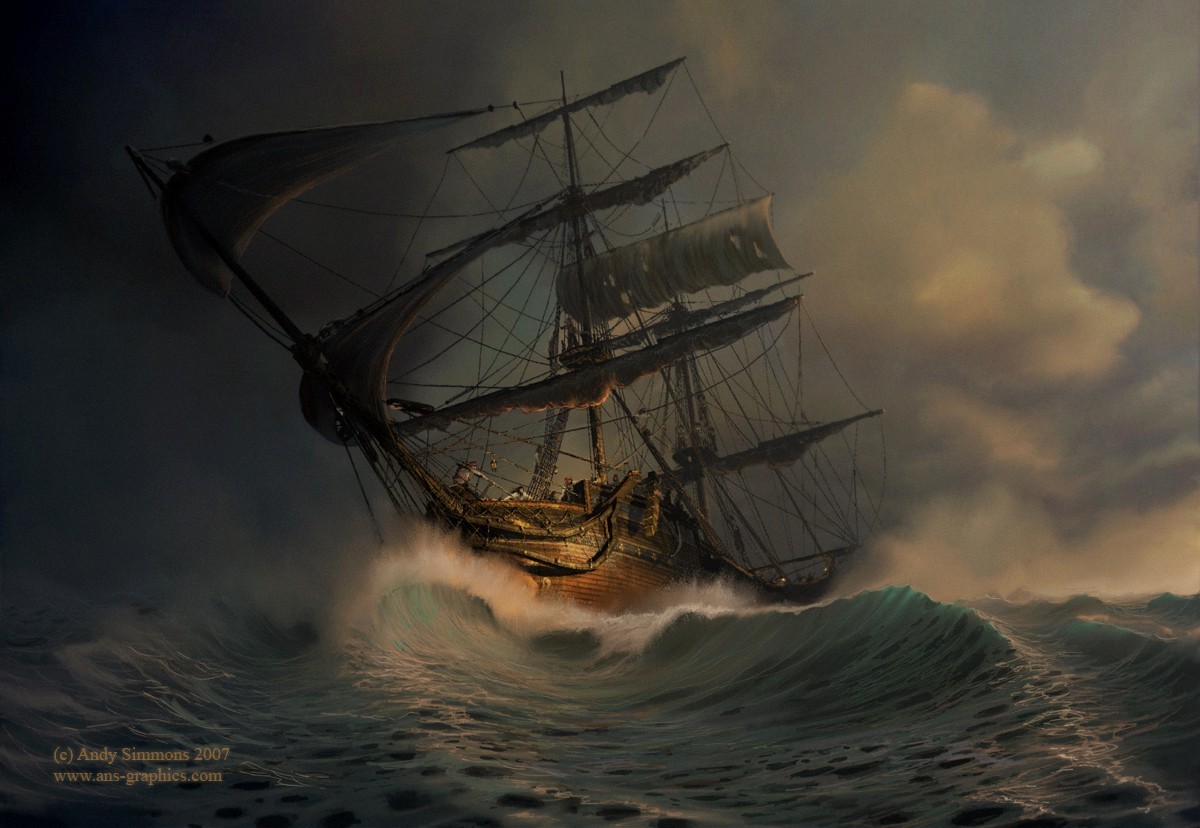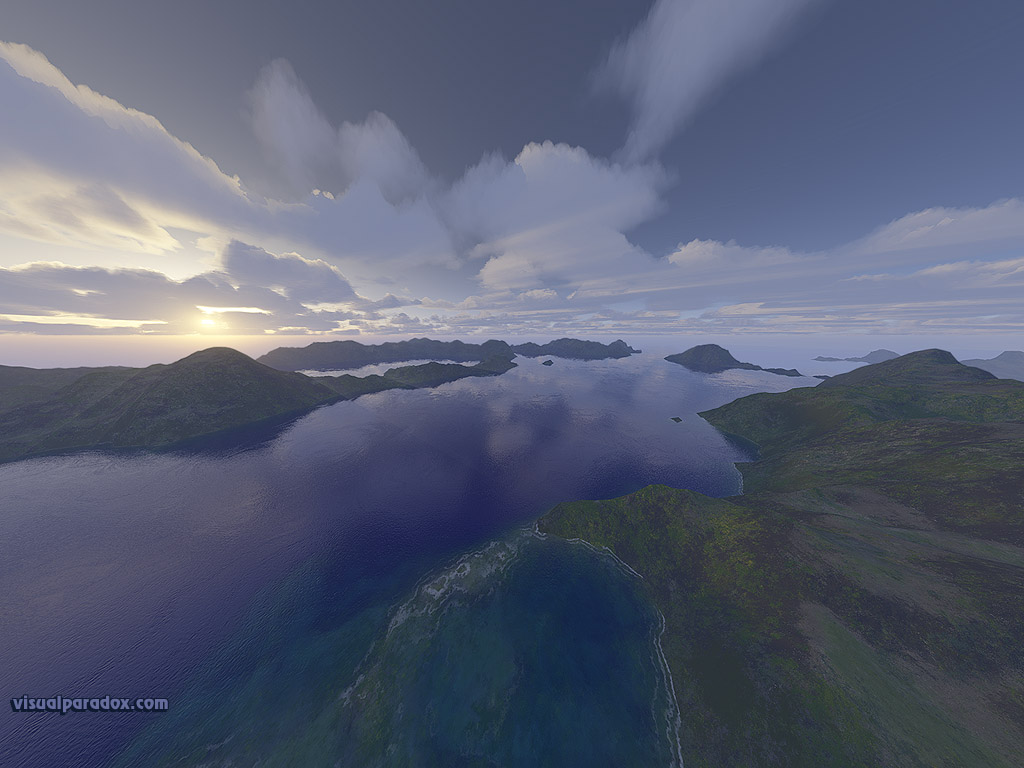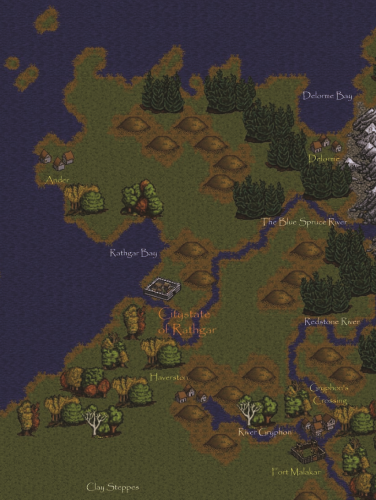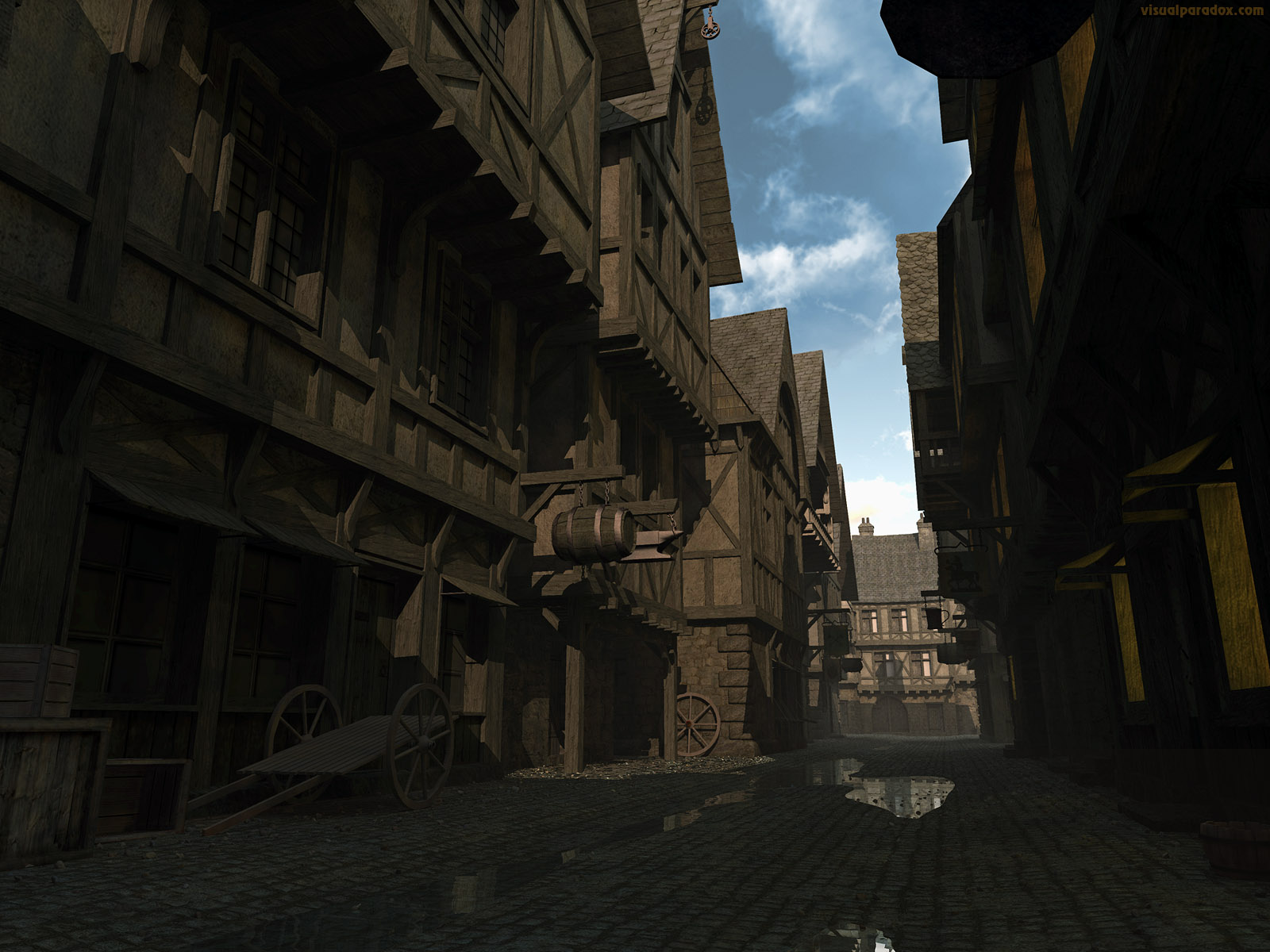Citystate of Rathgar
The largest city in all of Azermathia and the fishing capital of Tarien, Rathgar is a tolerant citystate that runs on commerce, freedoms, and hope. Ruled by its council of the city's wealthiest merchants, it is said that anything goes in Rathgar as long as you can get away with it. And while this ideology presents opportunities for many, the unrestricted society creates many shadows into which many unsavory characters fall.
Structure
Rathgar is an oligarchy. Ruled by the Rathgar City Council – an ever changing number of men and women from wealthy and powerful families. As most of these families have acquired their fortunes through maritime activities, everything in Rathgarian politics is driven by gold. Business leaders can simply purchase a seat on the Council and then use their power to set laws, use their influence over the Free Militia to arrest enemies, and generally increase their fortunes.
Culture
Society in Rathgar is one of extremes. While it is true that any man or woman can make their fortune in the city, via shrewd business sense, a strong arm, or sheer luck, the sad truth is that few do. Most are born into the working poor and remain so for their entire lives. Whether working as deckhands in the great fishing fleet of the city, as farmers tiling the surrounding grasslands on great plantations, or simply in the lower ranks of civil service doing everything from street cleaning to construction, the vast majority of Rathgarans are employed in some form or fashion by the wealthiest business owners. While not destitute, they lead simple lives from one meal to the next with little time or spare coin for any pleasures.
Diametrically opposed is the situation of the wealthy business leaders in the city. They have accrued their fortunes over the years through careful planning and ruthless business practices, building their wealth in whatever niche industry or service they have learned to manipulate best. This top tier of Ratharan society owns all of the shipyards, the fishing boats, and the farms. They rule the city form its Council and zealously guard both their wealth and power. With ample gold, business leaders have leisure time to spare, throwing countless balls and parties. These events, among the "society" of Rathgar are as much about demonstrating and accruing power as they are about entertainment. Guest lists are scrutinized and societal slights can be held against rivals for years.
History
Southern Tarien in general, and the Azermathian Frontier in particular, had long remained a mystery to the humans of Eldoria and Galencia. Indeed, humans only first explored this continent – south of the Isthmus of Geltamar at least – in the early Sixth Century. In 513 AC, the great Yatian sea captain, Sir Cedric Kandar, first sailed into the Gulf of Azermathia and saw lush trees with the snow caps of the Grey Peaks in the distance. With such a breathtaking view, he ordered that his ship drop anchor, and rowed ashore at the mouth of the Blue Spruce River. His crew explored the forests, and found to, to their surprise, that the thick trees were only a thin strip along the ocean. Behind them, he found the red earth of the Clay Steppes. This vast expanse of golden grasses, strange herbivores, and thirsty earth did not interest him. He planted a flag in the center of modern day Rathgar for Yaty, boarded his ship, and set sail.
Not five years later, a fishing expedition, lead by Captain Johan Rathgar arrived in the Gulf armed with fishing rods and a mage to freeze their catch, setting off a game fish craze in the Inner Seas. Over twenty years later, the summer fishing season saw the Gulf filled with vessels when a freak storm send the ships scurrying into the nearby Bay for shelter. The captains, finding the harbor both deep and well protected, observed that it might make an excellent port, taking news of the new bay - named for the Gulf's first and now long retired fisherman - back to their taverns back home. By year's end a small encampment had been erected by a Yatian company.
The next decades saw the village grow in size, expanding from an outpost a taverns and brothels to a small, self sustaining colony. All of that was wiped out in 550 AC when Hans von Ghana's ship pulled into the harbor to find nothing but ash. His sailors, wary of evil spirits, made a cursory investigation of the site and, finding a few arrowheads, declared it the work of Goblin raiders. Many scholars, however, find the total destruction described by the Ghana's crew incongruent with a Goblin attack and have speculated that the village may have fallen prey to one of the dragons often seen soaring about the Grey Peaks.
Regardless of the source of destruction, its memory kept settlers from returning for over 60 years. Fleeing the devastation of the Mage Wars - or perhaps seeking to fill an economic void left now that magi could not preserve fish catches from the Azermathian sea - Miles Ravenwood and Theo du Marche, two Eldorian businessmen packed 500 settlers and soldiers onto a half dozen ships and set forth to resettle the bay. Within a decade the new settlement had successfully built out walls, established enough agriculture to supply themselves with food, and started a fledgling fish salting and pickling business started a fledgling fish salting and pickling business for the Prydthen ships that visited the Gulf. Unlike the first settlement at Rathgar, who's early days and disappearance remain somewhat of a mystery, the colonists took great pains to record their experiences. Hoping to provide a template for future colonies they even published their notes in short book entitled Azermathian Memoires.
Despite these successes, the early years of the new city nearly saw its demise. Settlers and soldiers alike had trouble finding crops that would grow in the warmer, wetter environment. Wheat seed, brought from Eldoria, failed two seasons in a row before the farmers domesticated a local rice. Worse, Goblins from the east raided continuously, skulking into the small village under the cover of darkness to steal precocious metal tools and food supplies. Matters came to a head in 631 AC when the Goblins, united under and unusually strong chieftain, lay siege to the settlement itself. Drums shook the night and the fires of outlying farms lit the night. The siege lasted for several weeks until, in a daring raid under the cover of a cloudy night, Theo de Marche and a dozen soldiers crept into the Goblin camp to kill the king. Without a unifying voice, the tribes once again fell to squabbling and the siege soon broke.
By 655 AC enough wealth had flowed into Rathgar from its fish processing operations that it had established a clear upper class. With that upper class came desires for some semblance of the luxuries available to those living int he Inner Seas and the idea of "summer homes", like one finds in the Eldorian countryside became popular. Many established these homes around Lake Havers. The fad ended some two decades later under increased pressure from Goblin raids, abandoning the settlement, and its great manors, to those with a more frontier like spirit.
Finally, in the 660s, salted marlin, already popular in Prydithen high society, became a favorite of Emperor Jethrick d’Uthar XIV and therefore a must have at every noble event in Karradone. An increased number of Eldorian vessels began trawling the Gulf, competing with the Prydithen and Yatian ships already fishing the area. Yatian captains, fearful that the Eldorians will overfish the region and deprive them of their lucrative livelihood, pressure the citystate to claim Rathgar as a formal colony. In response, Eldoria sends ships from the Imperial Navy to enforce a blockade and claim the city as its own. Salting and pickling operations halt. The Inner Seas are deprived of their catch and Rathgarans of their livelihood.
Finally, the fishermen - both from the blockading nations and Rathgar itself - feeling the most economic pain from disagreement, banded together to form the Fraternal Order of Fishermen. Their first act was to ban the delivery of all fish - regardless of source - to the Imperial Palace. A year later the ranks of the Order thinned considerably, the Emperor finally caved and negotiated a compromise treaty with Yaty, splitting fishing rights and granting Rathgar its independence. Rathgar's economy boomed, the city's wealthiest form the City Council to govern local affairs and funding the expansion of the the expansion of the city walls in 692 AC.
Demography and Population
Like much of Azermathia, Rathgar has a largely human population. This is especially true in the outlying farms and far flung villages of Delorme and Ander which remain nominally part of the city-state. One could consider the goblin population of the forests east of the city as making these rural areas more racially diverse but the goblin tribes pay little attention to the city-state other than as a target for raids.
Within the city walls one is likely to find a smattering of representatives from the rest of Tarien. Displaced Dharjan, former slaves from Carboth and Khadric members of the Lost Clan being the most common. Like any other great port the city is home to a small population of Nerrid - though not enough to lay claim to more than a few buildings. A smattering of Soulmeliti, generally down from Hopki can be also occasionally be found conducting business with the city's elite.
Territories
The City-State of Rathgar sits at the mouth of the Blue Spruce River, where it tumbles into Rathgar Bay, at the eastern edge of the Gulf of Azermathia. The weather is hot and wet. Rain is a daily occurrence – though usually only for a brief period in the early morning or late afternoon, depending upon the season. Light rain falls with the rising sun from late fall until early spring. In the summer months, a heavy downpours are common – generally in the late afternoon. During the summer months, the afternoon heat is unbearable, and from the midday meal until after the rains, people generally do venture out doors – preferring instead to nap, read, or converse in shade of indoor cafes and central gardens.
The heat and humidity encourages plant growth, and the city is filled with palm and eucalyptus trees lining the street. Orchids and other tropical flowers are commonly found in window boxes and on roof-top gardens. The farms that surround the city provide rice, tropical fruits, squashes, and beans that are sold in local farmer’s markets.
As a result of the agreement betwen Yaty and Eldoira, the small towns of Delorme and Ander, to the north of the city, technically fall under the jurisdiction of the citystate. In truth, these agricultural communities as self-sufficient - including their own volunteer militias - and pay neither tax nor tribute to the city itself. Most Rathgaran's would even scoff at the notion of the towns having anything to do with the city and those few that have read the writ of independence would laugh at an Eldorian bureaucrat's understanding of anything in Azermathia.
Foreign Relations
With the exception of the tensions that exist between Drakkar and Warwick, all of the nation-states in Azermathia have generally, cordial relations. While none are staunch allies, most have come to the realization that life on the frontier is easier with partners than enemies. Proximity and trade with the Hinderlands makes them the closest "ally" to Rathgar. While contacts with the Palatiir Republic are less frequent, they the quality of Soulmelit inspired goods coming out of Hopki tends to make them more lucrative. The City Council tries to keep relations with the southern Kingdoms strictly commercial, though invariably one or the other tries to pull the city-state into their espionage and subterfuge.
Despite the fact that the Empire of Eldoria and the Citystate of Yaty nearly came to blows over Rathgar, neither seems to hold any grudge. Indeed, most of the states in the Inner Seas view Rathgar as simple a fishery. While they recognize their independence, they rarely consider the citystate in their own political machinations. Further abroad - in northwest Tarien or the far east, few include Rathgar in their plans and certainly none have any sort of diplomatic relations with it.
Agriculture & Industry
Beyond the obvious fish catch, the industry in Rathgar has grown around supporting the fleet that anchors in her harbor. The salting and pickling operations employ - and an absurdly low cost to the wealthy owners - hundreds of Rathgarans. These jobs are mindless, thankless, and often dangerous. More lucrative are skilled labor required to build and repair the ships themselves. Whatever backwards image the rest of Tarien may have of Rathgar, few argue with the craftsmenship of her shipyards, most ranking them behind only the mighty Yatian craftsmen in quality. These shipyards require lumber, and a small industry felling the great trees east of the city exists. This work may be the most dangerous in the Citystate as lumberjacks must contend not only with great saws and falling trees but also with Goblins that skulk in the forest's shadows.
Part of Miles Ravenwood's plan for the colony included farming. He insisted that Rathgar build up its food supply base beyond its own means, so that it someday might export these goods. That days has been slow in coming as traditional crops have not fared well in the Azermathian climate. Still, the farms surrounding the city have adapted, growing corn, yucca, sweet potatoes, beans, and melons. A few mango and banana orchards have started to yield fruit and may some day lead to exports. More promising, however, is the newly discovered sugar cane. Farmers have yet to figure out how to maximize yields and simplify its harvest but several wealthy families in the city have invested heavily in that research, betting on the fact that the Inner Seas will go wild for its sweet taste should they master its production.
Trade & Transport
While Rathgar has plenty of fish and fishing related operations, they have little else of interest to the rest of Tarien. They do, however, have a need for many goods from it, importing manufactured goods such as sextons, looms, and cloth from the Inner Seas. With little to offer back beyond the seafood catch, this disparity of trade has helped to keep the city-state a poor cousin and likely stunted its growth. For as bustling and modern as the city may appear to resident of Azermathia, it pales in comparison to the great cities of the north.
As the city has grown, it has added craftsmen and industry of its own, in an effort decrease its dependence on trade. the City Council has encouraged shepherds for wool and some farmers have experimented with a new crop that yields fibrous white threads called cotton. The process of harvesting and processing this new plant is, however, arduous and while helpful in decreasing reliance on the outside world, it has yet to become profitable.
As the first port of call in Azermathia, Rathgar does have a firm control on goods flowing further south into the Hinterlands and even the twin Kingdoms of Drakkar and Warwick. As most northerners would prefer not to travel deepy into the sub-continent, a number of Rathgaran's have built businesses by picking up this trade, acting as middle men between Azermathia and the rest of Tarien.
You could see scores of them, just below the surface, like rainbow sails racing alongside the ship, as magnificent in the sea as on the plate.
Cutpurse
Otick wove through the crowded wharf, easily navigating the press of sailors and fishermen despite heading the opposite direction. His eyes darting from person to person, he finally spied a likely mark - a fish monger struggling upstream to meet one of the inbound vessels. Late, the merchant hurried before him, carelessly allowing his purse to swing beneath his heavy cloak. Otick closed, bumped shoulders with the fellow, and muttered is apologies. The merchant, already last in queue ignored him completely, his eyes running over the sparse remnants of the catch laid out on a canvas tarp before him.
Otick smiled inwardly and reversed direction, allowing himself to be carried away by the flow of people heading for the taverns deeper inside the city. From the weight of the purse, he would eat well tonight. Of course, the Alliance would get its share, but he had enough for a fine meal, a bed, and even - should his luck hold - a night of dicing.
Behind him the merchant swore loudly. Otick, smiling openly now, quickened his pace.
Founding Date
616 AC
Type
Geopolitical, City-state
Training Level
Trained
Veterancy Level
Trained
Demonym
Rathgarans
Government System
Ochlocracy
Economic System
Market economy
Subsidiary Organizations
Location
Official Languages
Controlled Territories
Neighboring Nations
Related Species
Magic in Rathgar
Like much of Azermathia, the arcane arts are officially outlawed in the the Citystate. That being said, the anti-mage fervor found in Drakkar and Warwick is not present amongst the merchants and priests of the city and the working poor and peasants do not have the same raw fear that one might find in the Hinterlands. This means that while officially, the penalty for practicing the art may be death, but the penalty has not been enacted for over a generation. Indeed, many of the most educated members of Rathgaran society privately feel that hostility against the art is an inherited weakness, a sign that the city has not evolved past its Inner Seas roots. A few have even been known to employ practitioners - surreptitiously, of course, in pursuit of their own political gains.
Blackened Ruins
About a league beyond the city gates, past the largest rice paddies and orchids that feed the city, and blocking the well worn cart path that generally follows the contours of the Blue Spruce River, lies the site of the original settlement. A mere five hundred yards across, nothing remains except for a fine blackened ash. The fact that nothing will grow here, some two hundred years after its destruction, puzzles many. Locals, of course, consider the site cursed, though priests from several orders have found neither lost souls nor any other paranormal source of energy. Naturalists from the University of Karradone have examined the site as well, seeking to determine if some sort of blight has taken hold of the land but could find nothing. Strangely, the edges of the blight are curved and one clever cartographer has noted that the dark ash forms what would be, if one ignored the banks of the river, a perfect circle. Few consider the mystery today, choosing instead to simply follow the cart path that skirts the ruins, keep there heads down, and pray to Anderi to protect them from whatever darkness lingers.
Rathgar....Rathgar....Is that the one with all the sheep and the obsession over the light? No? The cows and those strange horned horses? No? Drat. Wait...I know, the one with all the fish? Right?





